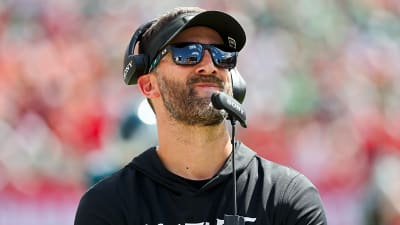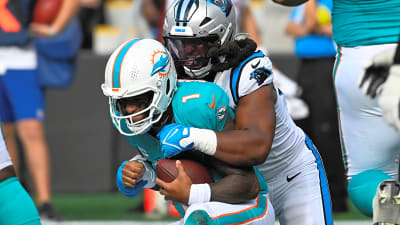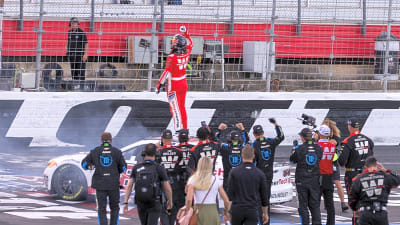
Nearly two months ago, at East Lake Golf Club, Brian Rolapp delivered his first public address as the Tour’s new CEO. Calm, calculated, but unmistakably bold, he signaled a seismic shift in the PGA’s structure. “The goal is not incremental change. The goal is significant change,” Rolapp declared. On paper, it sounded like progress, but in practice, the plan may be ruining opportunities for the next generation of golfers.
According to longtime golf analyst Gary Williams on the latest episode of the 5 Clubs podcast, Rolapp’s push for competitive parity might come at the expense of rising talent. “So Brian Rolapp used the term — he wants competitive parity… he thinks it’s very, very important,” Williams began. “The PGA Tour is competitive, and a system that shows there’s a lot of parity. It’s hard to break away… Scottie Scheffler’s done it, and we applaud him for it… but if they want competitive parity, they kind of already have established a system of it,” Williams continued.Williams then went on to highlight the changes being steered by Rolapp’s newly formed Future Competition Committee — a group led by Tiger Woods, which is tasked with carrying out the changes Rolapp chalked out. But Williams warns that behind all the buzzwords like “scarcity” and “simplicity” that Rolapp used in his first public speech, the impact is pretty clear — players are being quietly relegated, not just shuffled.
“The notion that people with brands on the PGA Tour are going to get relegated to the Korn Ferry Tour is highly unlikely,” Williams continued, pointing to the big names like Jordan Spieth and Max Homa who relied on several sponsor exemptions this year. What Williams is noting is that if players do not perform and earn their way into events and merely rely on sponsor exemptions, they could be relegated to other tours. And then Gary Williams touched upon the signature events.
While the new structure of the Signature Series promises exclusivity and elevated competition, it also creates a clear line between the haves and have-nots. Those who don’t qualify? Effectively relegated. Williams puts it plainly — “If you’re not in that series, you’ve been relegated.” And it’s not just talk. With Rolapp’s new vision, rookies and journeymen could now find themselves two steps away from the spotlight, with the Korn Ferry Tour downgraded to golf’s third tier.
And Williams then used the example of Steven Fisk, a PGA Tour rookie who stunned everyone by winning the 2025 Sanderson Farms Championship in Mississippi last week. “He was somebody who was loyal to his commitment to be at Grayson’s event… and here he is Sunday, hitting home run shots and winning a golf tournament,” said Williams. But what did that win get him? Not a Masters invite. Not a start in the Signature Series. Just a handshake, a trophy, and a nice check of $1.08 million.
“You cannot deprive somebody who wins on the PGA Tour,” Williams argued. “Anybody who wins on the PGA Tour should be green-lit for two Signature Series starts. You wrap putts in to win on the PGA Tour, you’ve got to get more than just starts in The Players and PGA Championship,” Williams continued. As he pointed out, the message from Rolapp’s vision is clear —Winning isn’t everything anymore.
Brian Rolapp said his three guiding principles when it comes to PGA Tour competition are …
1. Competitive parity
2. Scarcity
3. SimplicityThen he gave this answer about the reason the competition committee was created. Excellent, excellent, very adult stuff. pic.twitter.com/Y71HNWTwmG
— Kyle Porter (@KylePorterNS) August 20, 2025
But it’s not just Gary Williams raising eyebrows. Rolapp’s vision is starting to wear thin among the players, too — even some of the Tour’s most respected veterans. One of the most vocal? Lucas Glover, who recently shared his growing disillusionment on the Monday Q Info podcast.
Brian Rolapp’s Vision for the PGA Tour Faces Backlash from Players, too
Lucas Glover, who met with Rolapp earlier this year in Hartford, admitted he’s been dodging the CEO’s calls ever since. Why? Because the direction Rolapp is pushing, one marked by limited fields and oversized paydays, feels like a betrayal of what the PGA Tour once stood for. “When the new schedule came out, they added another signature event and took another full-field event out. That’s what made me realize that it wasn’t changing — it was going to get worse,” Glover said.
He was referring to the newly minted Miami Championship, a $20 million, 70-man field added to the 2026 calendar — a move that screams scarcity and exclusivity. Rolapp may call it streamlining the product, but Glover sees it differently — “All I’m hearing is the same conversation: money, money, money, money, money. When’s the last time anybody talked about the charity initiative of the PGA Tour? Nobody talks about that anymore.”
It’s a point that backs up what Williams said earlier — that the Tour’s new model seems more like it’s building a wall rather than building bridges to grow the game. Scarcity might make things feel more exclusive, as Rolapp puts it, but both he and others point out that it’s also choking the system that used to give a chance for newcomers to thrive. And if even winning doesn’t get you into the big-money events, like in Fisk’s case, or if full-field events keep diminishing, the message starts to feel pretty clear — this Tour isn’t for everyone anymore.
More must-reads:
- Lions CB Terrion Arnold to return 'sooner than expected'
- European powerhouses target Bournemouth star following stellar form
- The 'Active 10-reception NFL games' quiz
Breaking News
Trending News
Customize Your Newsletter
 +
+
Get the latest news and rumors, customized to your favorite sports and teams. Emailed daily. Always free!








